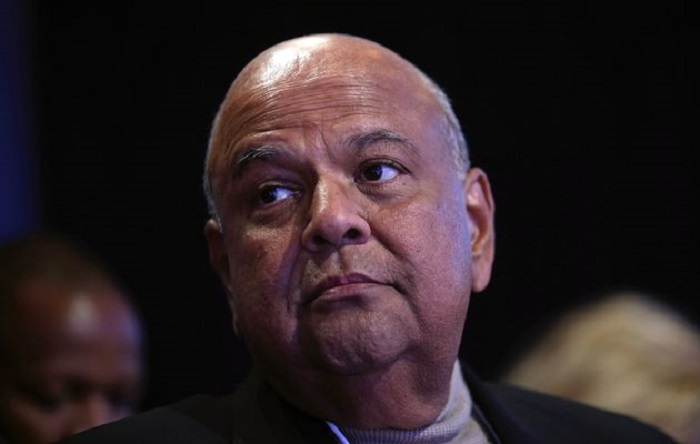If Finance Minister Pravin Gordhan were to be arrested and charged by the Hawks’ crimes against the state unit, it would likely be for contravening the country’s intelligence laws.
The Sunday Times reported that Gordhan’s arrest was “imminent”. The Hawks had handed over their docket to the National Prosecuting Authority (NPA) and prosecutions boss Shaun Abrahams (who should perform his duties without fear or favour) was awaiting “political go-ahead” to continue with the prosecution.
The NPA on Sunday denied that it had received the docket from the Hawks, but said an NPA prosecutor was leading the investigation into the so-called “rogue unit” that operated in the South African Revenue Service (Sars).
The presidency called the story the work of “dangerous information peddlers”. In a separate statement, the presidency said there were “no plans” to remove Gordhan but reiterated that “ministers serve at the pleasure of the president” and that it was President Jacob Zuma’s prerogative “to hire and fire ministers at any time”.
This is cold comfort for Gordhan, who should be meeting with his lawyers to devise a strategy for worst-case scenario.
Did Gordhan break the law?
It seems that the trio of Tom Moyane (Sars), Berning Ntlemeza (Hawks) and Shaun Abrahams (NPA) are committed to prosecute Gordhan and others for setting up an investigations unit inside Sars. I’m deliberately not calling it an intelligence unit, because that is the heart of the case.
Besides all the clutter and noise, this is what is comes down to: did Gordhan, former finance minister Trevor Manuel, his deputy Jabu Moleketi and former Sars head of risk Ivan Pillay break the law when they agreed in February 2007 to establish “intelligence capacity” inside Sars “to address the illicit economy”?
Initially Sars considered the formation of a ring-fenced unit inside the National Intelligence Agency (NIA), but discussion broke down after a change of the guard at the spy agency. Former president Thabo Mbeki fired NIA boss Billy Masetlha in 2006 and replaced him with Manala Manzini.
Early in 2007 it was decided to move the unit, eventually called the National Research Group (NRG), inside Sars. As has been pointed out by legal commentators, state departments are allowed to gather “departmental intelligence” but not in a “covert manner”.
Gordhan told the Hawks, in response to their 27 questions, that his legal advisors were satisfied with the structure of the unit and that it was necessary to “penetrate and intercept the activities of tax and customs related crime syndicates”.
Valid concern
Legal expert Pierre de Vos has questioned whether this was at all a criminal matter and why the Hawks – and specifically its head of crimes against the state – was investigating the case.
This is a valid concern. The vigour with which Moyane and Ntlemeza have been pursuing this case has been lacking from South Africa’s anti-corruption bodies for a number of years. Not since the prosecution of former police boss Jackie Selebi by the Scorpions have we seen this level of involvement and intensity by law enforcement agencies and senior civil servants in a single case.
Of course Selebi’s case, unlike the investigation into Gordhan, involved real corruption.
The second charge Gordhan is likely to face (if he is charged) involves Project Sunday Evenings, an alleged clandestine operation run by members of the NRG.
The allegation is that senior state prosecutor Gerrie Nel (who headed up the Scorpions in Gauteng) and chief investigator Andrew Leask procured CCTV equipment to safeguard the NPA’s Silverton office during the Selebi and Zuma investigations.
Unbeknown to them, the security “experts” who had installed the equipment were also on the payroll of Sars’ NRG and leaked recordings of what happened at the NPA’s office to Pillay via a third Sars investigator (Sars had a keen interest in the Selebi and Zuma matters at the time).
Gordhan has denied any knowledge of this project and the Sars investigators have allegedly declined to testify against him.
Gordhan, who is widely credited for saving South Africa’s economy from being downgraded to junk status after Zuma’s disastrous axing of Nhlanhla Nene in December, has limited options.
He can wait and see, but risk being humiliated by the Hawks and the NPA, as was the case with Nel in 2008 when a heavily-armed police squad arrived at his home and arrested him on trumped-up charges. He spent the night in a police cell.
Disastrous for the economy
Alternatively he can follow a more aggressive approach, applying to the high court for an urgent interdict against the NPA and the Hawks, asking the court to interdict them from arresting or charging him if he believes the charges against him are politically motivated. This will force Abrahams’ hand to reveal his case to a high court judge, but will open Gordhan to criticism that he thinks he is above the law.
Arresting Gordhan will naturally be disastrous for the economy, but Zuma will merely say he couldn’t interfere in the independence of the NPA and the Hawks. Until a criminal trial clears his name, Gordhan will be accused number one while the case drags on for years, but he will be safely out of the way of the Guptas, who view him as enemy number one.
Peter Bruce, editor-in-chief of Business Day, wrote on Sunday that Brian Molefe, the new Eskom CEO, could succeed Gordhan. What seemed impossible a few weeks ago, suddenly feels closer than we thought. Remember, Zuma can “hire and fire ministers at any time” as he reminded us over the weekend.
[Source: News24]





 WhatsApp us
WhatsApp us 

